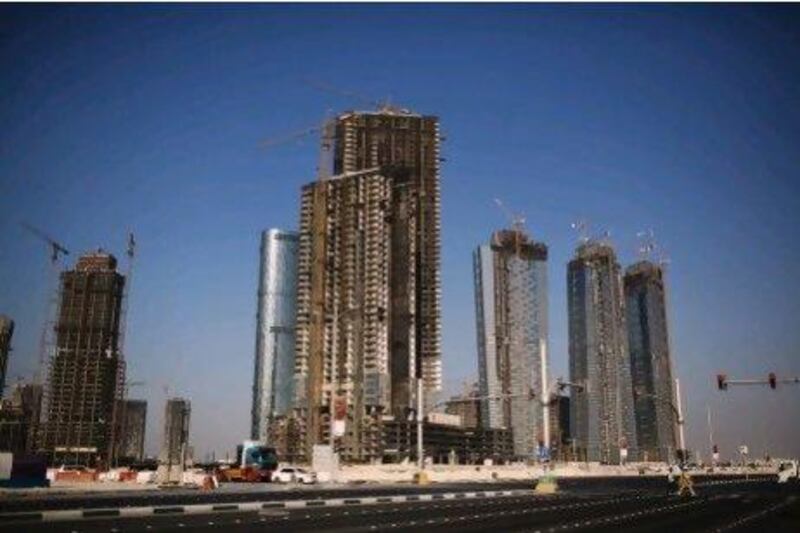Abu Dhabi's most ambitious residential project is emerging from the dunes of Reem Island.
The first residents began moving into the towers of the Sun and Sky and Marina Square developments this spring, while thousands more are expected in the next few months.
Video:Is the Reem dream finally coming true?
Kevin Brass discusses the prospects for key Abu Dhabi development Watch full screen
A troubled birth Read all The National's coverage of the much-delayed Reem Island. Learn More
But the US$30 billion (Dh110bn), 846-hectare development is still in its infancy.
"The island is designed for a population of 200,000," says Joe Ong, the managing director of Tamouh, one of the island's three master developers. "Today we have hardly 1 per cent."
More key projects are coming soon. The first bridge, connecting Sowwah Island and a one-way link bringing traffic to Reem, is set to open within a few weeks. A second, two-way bridge, will open within a year, says Tariq Sultan, the chief executive of Bunya, the company charged with developing all the island's infrastructure.
Bunya this month awarded a Dh116.6 million contract to Gulf Dunes Landscaping and Agricultural Services. The deal includes plans for 430 shaded areas along the 16 kilometres of road and the planting of 1.5 million trees and shrubs. Bunya has almost completed the initial phases of laying utility lines that will ultimately service the entire project.
"The first phase is really the heart," says Mr Sultan. "A lot of the core utilities are now in the ground."
But there have been growing pains. Handovers in both Sun and Sky and Marina Square were delayed for months while the builders arranged for final permit approvals from the Abu Dhabi Government.
Reem is also feeling the effects of the economic slowdown, which has dampened the property business throughout the Emirates. Sales of apartments have slowed to a crawl for projects under construction.
Only about 30 per cent of the apartments in The Gate, Sorouh's development with more than 3,000 residential homes, have been sold. With the off-plan market virtually dead, there is little chance of selling the remaining ones before construction is complete next year.
"Demand is for finished product," says Paul Middleton, Sorouh's director of sales and marketing.
The Gate, like several of the projects on the island, was scaled back. Smaller developers on Reem have stopped or slowed construction.
Most of the projects completing now were started before the economic downturn. New projects will face a well-saturated market, with competition from developments under construction on Raha Beach and the Corniche.
The number of residential properties in the capital is expected to jump from 189,800 to 247,000 by the end of 2013, an increase of 57,200, according to Jones Lang LaSalle, the property company.
Some changes to the original scheme will have to be made, say the developers. With so many luxury homes on the market, affordable housing will be a higher priority.
"What does the market need?" says Mr Ong. "We have to be flexible."
But unlike many developments in the region, there is constant activity on Reem these days.
Reem Investments, the master developer for about 20 per cent of the island, has almost completed infrastructure work for two-thirds of the property, known as Najmat. The company sold about half the plots in the first two phases before the downturn.
The developer also plans to start construction on a project with 42 luxury villas, Nalaya Villas, says Paul Ashton, the development director for Reem Investments. "As soon as we get final building permit we will be moving forward."
But the company is still uncertain about what will happen with the third and final phase of Najmat. "That will be decided later, more in line with market demand," says Mr Ashton.
Meanwhile, around the island, the first signs of a community are forming. Retail centres are signing tenants. Sorouh expects to open the island's first supermarket, a Waitrose in Sun and Sky, in the first quarter of next year.
"Now it is a question of place," says Gurjit Singh, the chief operating officer of Sorouh, the developer of the Shams on Reem Island. "The place is starting to form."
Concerns that the new projects on Reem will simply add to an oversupply of apartments in Abu Dhabi, driving down rents and sale prices, are overblown, say the island's developers.
"The underlying principle of real estate is location," says Mr Singh. "Each location will have selective stability."
Reem may not make its initial projected completion date of 2023. But delays and slowdown are not necessarily a bad thing, says Mr Sultan.
"It would have been crazy to cope with all this in a short time," he says. "At least we can plan it in the right way."





